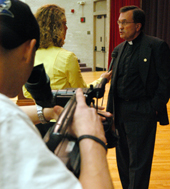According to the Rev. Kevin Wildes, S.J., university president, the evolution of gene therapy is of the most exciting events in medical history. It is also one of the most frightening, Wildes said in a lecture last Monday night.
Students, faculty and alumni filled Nunemaker Hall to listen to the first in a four-part lecture series discussing medicine and ethics. Wildes, who titled his lecture “Genetics and Medicine: Decisions for all generations,” spoke on the future of medicine, technology and the ethics of both.
The lecture sparked much discussion over future ethical practices in the medical field. The sponsors included Compass, Loyola Life, Residential Life and many other clubs.
During his lecture, Wildes explained that medicine has greatly evolved in the past 30 years. Thanks to improvements in other fields such as fibro-optics and computers, the medical field has continued to exponentially advance. Because of the advancements in technology, Wildes said that the medical field has developed “genetic medicine.” Genetic medicine allows the medical field to gather information on human genes and examine them to prevent many diseases and birth defects.
As the discussion continued, Wildes talked about death and our control over it. Wildes explained that 85 percent of all people who die every year make their own decision to die. Many die because they or their family members choose not to accept medicine.
Because of advancements in technology, humans have evolved from “chance to choice,” according to Wildes. Humans have much control over their health and their lives. In the past, humans usually died from diseases that they couldn’t control or that they didn’t have enough knowledge about to prevent. Now humans can prevent diseases and malformations.
Wildes then began to discuss other possibilities in genetic medicine. He explained that the next task in genetic medicine is scientists’ ability to map out genes and alter them.
Many people have discussed whether or not human intervention in genes is healthy, dangerous or ethical. Many people have debated the thin line between therapy and enhancement. Wildes also brought up that another problem that arises from the possible intervention of altering genes is what is seen as normal. If a person has a disease, he or she is seen to be not “normal.”
Because there are no characteristics to accurately describe a person as “normal,” many physicians will have to decide if altering genes of people will just cure them of the disease or cause other problems for them.
Audience members asked Wildes about the Catholic position on advancements in genetic medicine. There was also discussion about the importance of the Catholic Church in persuading people’s opinions on public policy about genetic medicine.
“With greater choice comes greater moral responsibility,” Wildes said after he was asked about his personal opinion on the future ethics of genetic medicine.
Three other speakers were featured in the series. Boyd Blundell, assistant professor of religious studies, spoke March 1 on “Dancing with the Devil: Identity politics and bioethics.” Dorinda Bordlee, ESQ, from Americans United for Life, discussed on March 2 “Human Rights for All: What Everyone should know about cloning and stem cell research.” Father Tad Pacholczyk gave the last lecture titled “Of embryos and Souls: Should we be destroying embryos and cloning humans” on March 3.
Krystle Robinson can be reached at [email protected].








